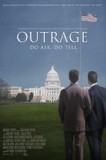| Reviews & Columns |
|
Reviews DVD TV on DVD Blu-ray 4K UHD International DVDs In Theaters Reviews by Studio Video Games Features Collector Series DVDs Easter Egg Database Interviews DVD Talk Radio Feature Articles Columns Anime Talk DVD Savant Horror DVDs The M.O.D. Squad Art House HD Talk Silent DVD
|
DVD Talk Forum |
|
|
| Resources |
|
DVD Price Search Customer Service #'s RCE Info Links |
|
Columns
|
|
|
Outrage
Documentarian Kirby Dick is a rabble-rouser, and an unapologetic one. His last film, the ridiculously entertaining 2006 nose-thumber This Film Is Not Yet Rated, was an exposé of the hypocrisy and lack of transparency in the MPAA rating system, and included the disclosure of the secret members of that organization's ratings board. He goes a step further in his new film, Outrage (or, as it is cleverly designed in the title sequence, Out Rage), which freely and openly discusses the rumors of homosexuality that have long swirled around several prominent lawmakers.
Those disclosures are certainly what will get the most attention in the coverage of Outrage, but the movie is about much, much more than that. Dick sets the stakes high at the beginning of the film, when he (or the text on his screen, anyway) alleges a "brilliantly orchestrated conspiracy" that has kept gay lawmakers in the closet and has kept the media from investigating why it is that the very same men who are reportedly in the closet work so very hard to advance the anti-gay agenda. "There is a right to privacy," notes openly gay Representative Barney Frank early in the film, "but not a right to hypocrisy."
The jumping-off point for Dick is the 2006 arrest of Larry Craig (his interrogation tape audio is brilliantly used in the film's opening credits). The director digs up news footage of Craig vehemently defending his heterosexuality during the House Ethics Committee's 1982 investigation of Congressional sex scandals and takes a good, close look at his voting record on hot-button gay rights legislation. Other recent politicians that come under Dick's microscope include Florida governor Charlie Crist, Virginia representative Ed Schrock, California representative David Dreier, and Louisiana representative Jim McCrery (though surprisingly, disgraced Florida representative Mark Foley is only mentioned in passing).
Dick doesn't just focus on current politicos, however; for context, he dips clear back to Roy Cohn and profiles NCPAC co-founder and chairman Terry Dolan, a closeted gay man who died from AIDS complications, though he openly criticized the gay rights movement and discouraged the Reagan administration (to which he was closely tied) from showing any acknowledgment of the disease. "That closet can kill people," one of his critics in the film notes, "and it has." Former New York City mayor Ed Koch comes under some of the same scrutiny; his rumored relationship with Richard Nathan is here confirmed by a mutual friend, and activist Larry Kramer alleges that Koch's own fears about being outed prevented him from confronting New York's AIDS epidemic during his time in office.
"Everyone loves a good outing," notes a commentator in the film, and while this is probably true (these allegations and the examination of them is fascinating), Dick doesn't make light of what he's doing. He spends a good deal of the film with Mike Rogers, the blogger who has investigated and outed several of these politicians, and gives voice to those who object to this practice. And Dick isn't just making a gossipy whisper-fest. He doesn't short the themes of sexual identity and the importance of coming to terms with one's own self--particularly when denying that can hurt so many others. It is here that the participation of former New Jersey governor Jim McGreevy is so valuable; he talks about living a double-life and draws parallels to the "spinning" of politics and of one's own personal life. Dick ingeniously intercuts this with particularly potent interviews and news images of Governor Crist and his campaign girlfriend (she doesn't go on camera, but her off-camera statement about Dick's line of inquiry is quite the bombshell).
Dick also floats the compelling argument that voting against gay issues is, for these closeted politicians, analogous to joining in on gay bashings as a young man. That guilt, and the burden of carrying around that kind of psychological weight, clearly took a toll on former Arizona representative Jim Kolbe; his story, and the footage of his speech on the House floor condemning the Federal Marriage Amendment, provide a surprisingly emotional climax for the film.
Outrage is beautifully constructed; the director-as-investigator motif used (more literally) in This Film serves Dick well again, particularly when he tracks down the (seemingly credible) sources for many of the rumors. Archival footage, stills, and interviews are convincingly assembled to make Dick's case, which becomes more persuasive and bitter as the film draws to a close. It's not as much ballsy fun as This Film, primarily because the more serious subject matter doesn't allow as many opportunities for snarky bomb-tossing (though I could all but hear Dick rubbing his hands gleefully as he uses the on-screen text "Now, here's where it gets interesting" in a key moment). But this is a more important film--it's funny, yes, but it's also angrier and timelier, and with a vital, imperative story to tell.
Jason lives in New York. He holds an MA in Cultural Reporting and Criticism from NYU.
|
| Popular Reviews |
| Sponsored Links |
|
|
| Sponsored Links |
|
|
| Release List | Reviews | Shop | Newsletter | Forum | DVD Giveaways | Blu-Ray | Advertise |
|
Copyright 2024 DVDTalk.com All Rights Reserved. Legal Info, Privacy Policy, Terms of Use,
Manage Preferences,
Your Privacy Choices | |||||||











